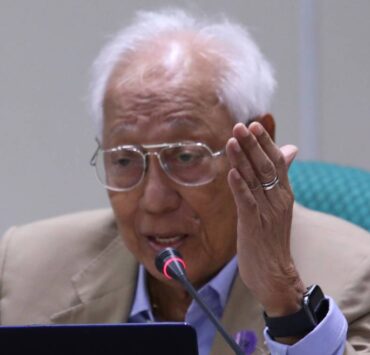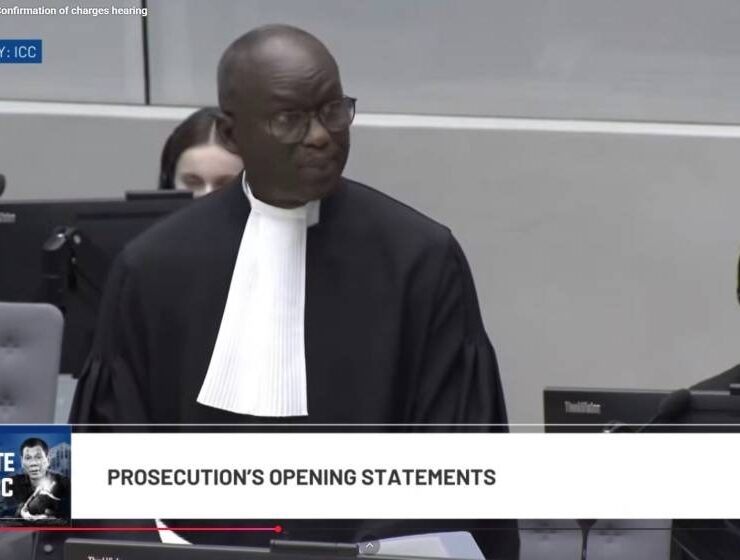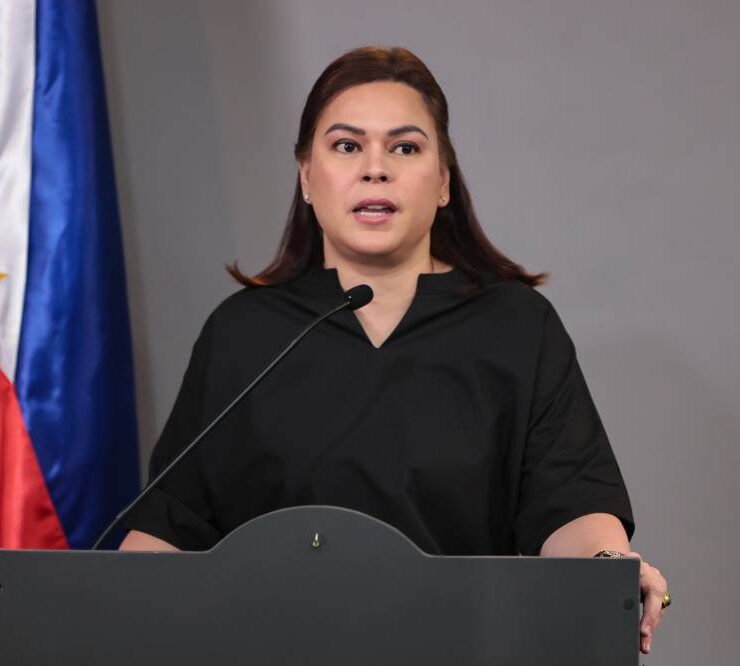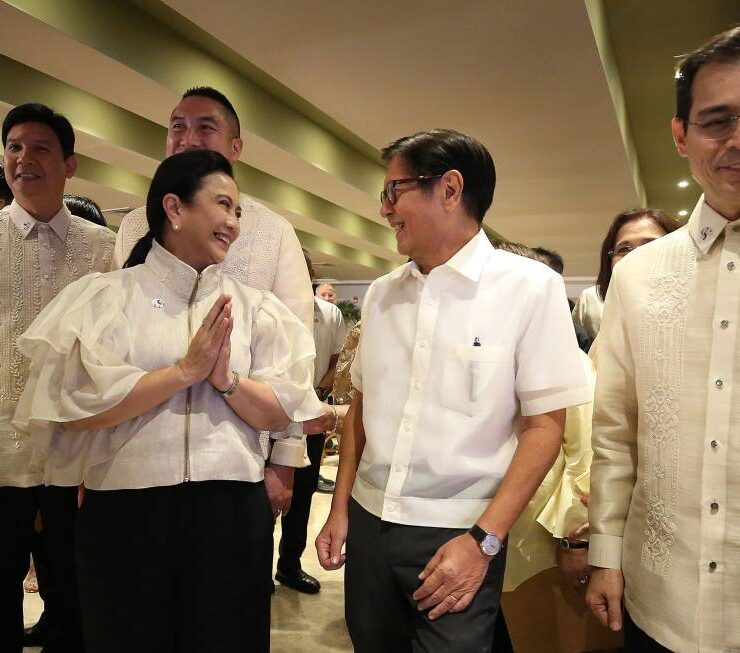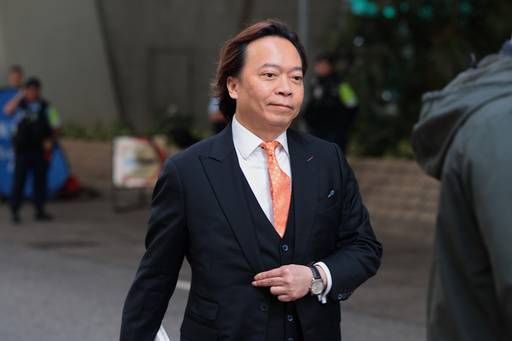UP law faculty: Senate must do duty, put VP on trial
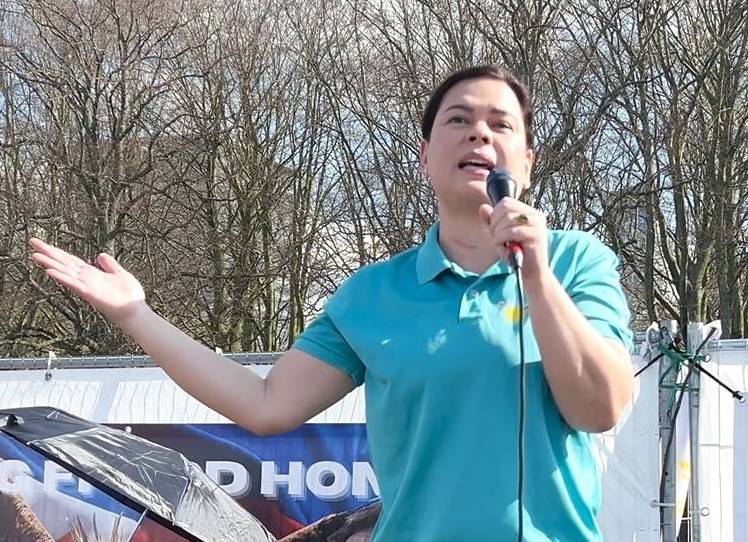
More than 100 faculty members of the University of the Philippines College of Law (UP Law), which has bred some of the country’s best legal minds, urged the Senate not to abandon its constitutional duty to proceed with Vice President Sara Duterte’s impeachment trial as her supporters move to dismiss the case against her.
“A premature dismissal will undermine the core democratic principle of checks and balances,” the UP Law faculty said in an open letter to the senators on Thursday. “In contrast, proceeding with the impeachment trial will uphold the Senate’s constitutional mandate on public trust and accountability.”
“As teachers and scholars of the law, we believe that the Senate’s dismissal without hearing even a single witness will mean abandonment of its proud tradition as an august chamber and permanently alter our system of checks and balances,” they said.
Expressing “grave concern” over proposals to declare the Vice President’s impeachment case as “functionally or de facto dismissed,” they argued against the justifications for aborting the process—the right to a speedy disposition of the case against her and the “non-continuing character” of the Senate.
On Bato resolution
According to them, the grounds contained in one draft resolution, which avowed Duterte supporter Sen. Ronald “Bato” dela Rosa admitted he had authored, were “unsupported by factual developments and a proper reading of the Constitution.”
Even with four months of inaction by the Senate on the articles of impeachment it received from the House of Representatives on Feb. 5, Duterte’s right to speedy disposition of the case against her was not violated, the law faculty said.
“The trial of impeachment cases is a proceeding in the Senate which, in this context, does not even sit as an ordinary legislative body but as a constitutional office of accountability,” they said. “On the text of the Constitution alone, the right to speedy disposition would not apply.”
Even if that right did apply, the Vice President was “not prejudiced by these delays,” mainly because she never sought a dismissal from the Senate or the start of her trial after the articles of impeachment were transmitted.
Expecting ‘bloodbath’
They cited Duterte’s petition in the Supreme Court seeking an injunction against the trial.
“Applying the Court’s established tests, the Vice President’s right to speedy disposition was not violated by the deferral of the trial’s commencement,” they pointed out.
Even though she had not withdrawn her petition in the Supreme Court, Duterte herself said she was looking forward to her impeachment trial because she wanted a “bloodbath.” Later, she said she agreed with 88 percent of Filipinos polled by the Social Weather Stations that she should be tried.
The law professors noted that according to the 1987 Constitution, the Senate, acting as the impeachment court, should “forthwith proceed” with the trial once the articles of impeachment were transmitted by the lower house.
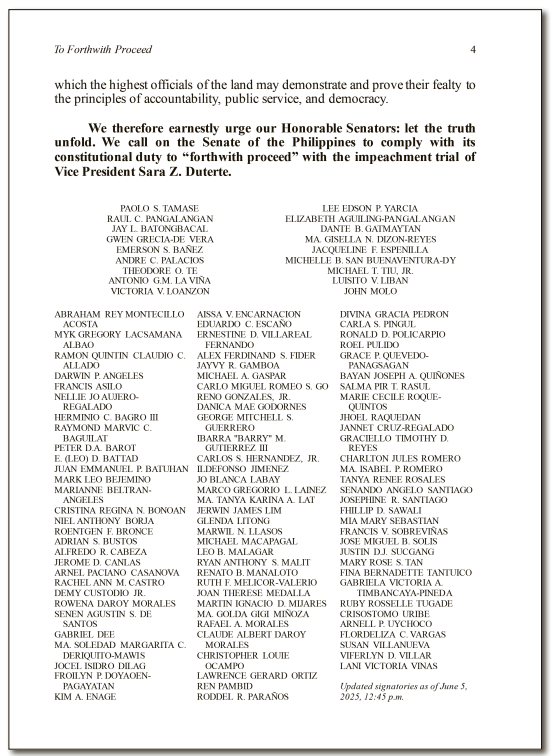
‘Continuing body’
However, the Senate did not take immediate action on the impeachment case, with Senate President Francis “Chiz” Escudero, himself a UP Law graduate, announcing the start of the impeachment trial process on June 2, only to move it to June 11, just days before the current, or 19th Congress, bows out.
As for the “non-continuing character” issue, the law faculty said that while the Supreme Court had made pronouncements the Senate is not a “continuing body,” this should be “read in their proper context” in the case of an impeachment as provided by the Constitution.
They said that the Supreme Court’s rulings in “Neri v. Senate” and “Balag v. Senate” were not applicable to an impeachment since these pertained only to the Senate’s legislative investigations.
On a higher plane
On whether the impeachment trial could proceed to the next, or 20th Congress, they said that while Senate rules, particularly Rule 44, state that “all pending matters and proceedings shall terminate upon the expiration of one Congress,” it would not apply to impeachment proceedings.
They explained that the rule applied to the Senate’s regular and legislative and non-legislative business.
“[I]mpeachment is not an ordinary legislative and non-legislative business: it is a distinct and singularly important constitutional duty,” the faculty members said.
They cited Article XI of the Constitution that provides guidance to impeachment proceedings that was specifically addressed to the Senate, “not to Congress generally.”
“In contrast to the hundreds of bills, resolutions, and investigations that the Senate deals with, the trial of an impeachment rests on a higher plane,” they said.
Estrada, Corona precedents
This “special character” of the Senate was already confirmed by its own precedents, or the impeachment trials of former President Joseph Estrada and former Chief Justice Renato Corona.
In the Estrada and Corona trials, the Senate had already adopted the terms “impeachment court,” “senator-judges” and “political neutrality,” while commissioning their robes and recognizing their special constitutional role that transcends the day-to-day work of the lawmakers.
“In any event, the question of whether trial should continue after the Senate adjourns sine die should not be preempted by the 19th Congress but should be left to the 20th Congress,” they said. “For the Senate to decide for the 20th Congress would be undemocratic, contrary to the very rationale underlying the ‘non-continuing body’ argument.”
The law professors said the moves to abort the impeachment trial were deeply concerning, “not because we necessarily believe in the charges” but because, “we wish to see the evidence, hear the Vice President’s defense, and with our fellow Filipinos, judge for ourselves her fitness to continue in public service.”
Impeachment as an accountability mechanism, was not simply stated in the 1987 Constitution, but has been confirmed “by constitutional and political history,” the law faculty said.
They again cited the Estrada impeachment trial wherein the controversial non-opening of the second envelope “was premised on evidentiary objections regarding relevance and materiality.”
“For the people, it was suppression of the truth that ended in the removal of a President,” they said, referring to the second Edsa uprising that forced Estrada to step down.
In his impeachment trial, Corona “abruptly walked out” before the senators could ask questions after he delivered an “emphatic statement” defending himself.
In the “difficult moments” now confronting the nation, Filipinos look up to the Senate as “the forum for the country’s most important truth-telling procedure.”
120 signatories
“Respectfully, a dismissal at this point would be deemed by the Filipino people as effectively engineered by the Senate’s own delay and an abdication of its constitutional role in impeachment,” they said.
By midafternoon on Thursday, 120 professors and lecturers had already signed the open letter. They included retired International Criminal Court judge and former UP Law Dean Raul Pangalangan; constitutional law professor and human rights lawyer Antonio La Viña; former Supreme Court spokesperson Theodore Te; constitutional law professors Dante Gatmaytan and Paolo Tamase; and maritime law expert Jay Batongbacal.
Failing to proceed with the trial would also affect the Senate, as well as the Filipino people’s trust in the chamber, they said.
“It will … undermine the people’s trust in the Senate as an independent and impartial institution before which the highest officials of the land may demonstrate and prove their fealty to the principles of accountability, public service and democracy.”














